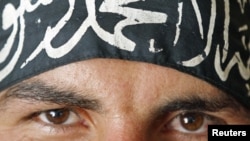Recent newspaper headlines say that al-Qaida or related jihadist groups are flocking into Syria to help the opposition bring down President Bashar al-Assad’s government. The reports suggest that the militants want to foment chaos, fan sectarian tensions and, ultimately, shape a post-Assad era along strict Islamist lines.
If true, the reports could bolster the Assad regime’s contention that the rebels are “foreign terrorists” and significantly impact international willingness to intervene or arm the rebels.
The latest such report came this week on the front page of the Washington Post, which could influence how U.S. officials and lawmakers decide on helping the rebels.
VOA has spoken to analysts, activists and opposition members inside and outside Syria to gauge the prevalence of al-Qaida and other jihadist groups in the country — and what their long-term goals might be.
Evidence of al-Qaida
The publicly stated goal of Syria’s main opposition is to bring down Assad regime and replace it with a civil and democratic state. The Free Syrian Army is the main fighting arm of the rebellion, a diverse mixture of military defectors, local militia and civilians from various religious backgrounds.
The FSA has been joined by fighters from countries all across the region -- Libya, Turkey, Jordan, the Gulf and beyond. A March 2012 report by the Institute for the Study of War found that the bulk of foreign fighters in Syria have come from Iraq -- among them, Syrians who had been fighting alongside Sunni insurgent groups there.
Foreign fighters may help the insurgency by offering technical expertise and combat experience, but they can also bring radical ideology...Joseph Holliday, Syria’s Armed Opposition, Institute for the Study of War..
Many analysts say that the flags and language of jihadism are clear indicators of al-Qaeda affiliation. Among them is Seth Jones, associate director of the International Security and Defense Policy Center at the RAND Corporation and author of Hunting in the Shadows: The Pursuit of Al Qa'ida Since 9/11.
“I have spoken to multiple senior officials in governments in the region and gone through numbers of attacks, put together an organizational structure of Al Qaida in Syria, the command nodes, and run it back by a range of senior officials,” Jones said. “I would estimate there are roughly in the order of 200 [al-Qaida operatives] that have been identified. We’ve identified whole cell structures.”
What they [FSA] need most right now is international legitimacy and support, and there are some concerns ...that having al- Qaida in the al-Nusra Front...is unhelpful In fact, it’s poisonous, actually.Seth Jones, RAND
Threat overstated?
Elizabeth O’Bagi is a research analyst with the ISW, a non-partisan, non-profit, public policy research organization in Washington D.C. which studies military affairs. “I think that especially in the media, there has been a tendency to confuse Islamic Salafism with Jihadism,” she said. “They’re very different.”
In the Syrian context, jihadists are those Muslims from outside Syria who believe it is their religious duty to take up arms against the Assad regime because it is oppressing fellow Muslims.
“And even the groups that tend to be more Islamist and Salafist,” O’Bagi said, “are very clear that they are not terrorists.”
Infiltration a natural development
Col. Riad Al-Asa’ad, the FSA Commander in Turkey, stresses that the FSA “categorically rejects allowing any al-Qaeda elements in Syria.” However, he tells VOA that because the revolution is so protracted and the FSA has received such little Western support, he would not rule out the possibility that “some elements” from neighboring countries may have infiltrated Syria. "The borders are open,” he said. “That would be a natural development.”
However, he hints at what amounts to a “don’t ask don’t tell” policy when it comes to the intentions of allied fighters: Any outside groups on the ground, he says, share the FSA’s goals of removing the Syrian president and establishing democracy.
“There are no religious groups on the ground,” he said. “There are fighters joining the FSA. All we have done is to unify all the fighters in Syria under the FSA. Thank God, everything is under control.”
If there are any groups or individuals acting as individuals, Al-Asa’ad says, that’s not the rule, but the exception. “That happens in all Arab revolutions.”
VOA also spoke with Mouhamed Saeed, spokesman for the Syrian Revolution General Commission in Aleppo, who said he has not seen any foreign fighters in that city. “We don’t have jihadist groups,” Saeed said. “There is just the Free Army in Aleppo, and any person who wants to fight against Bashar Al-Assad will be in the FSA.”
In a conflict fraught with information and misinformation, only a few things are clear:
The Syrian conflict is attracting fighters of various ideologies from across the region, and the longer the conflict continues, the greater their likely influx. Many Muslims now believe that the solution to their political problems lies in Islam. And, as one source told VOA, “if you’re there in Aleppo and you’re looking at Syrian army tanks ahead of you, do you really care what, exactly, the person next to you is believing?”











